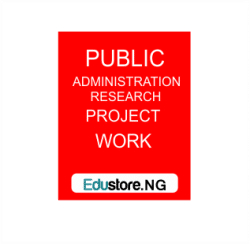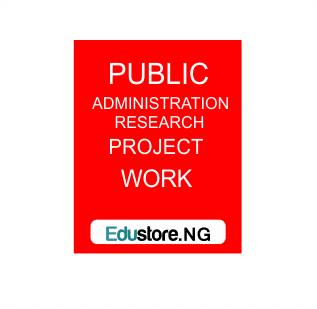Assessment Of Education Related Millennium Development Goals
ABSTRACT
The MDG 2 if achieved in Nigeria is expected to provide an increase in the number of primary school enrolment, completion and literacy rates comparable to other developed societies, yet current report by UNICEF indicated that Nigeria has 10.5 million out of school children – the highest in the world. This considerable gap in primary school enrolment, completion and literacy level, could mean complex social problems for Nigeria both now and in the future. Ensuring that the MDG 2 is achieved becomes important. The objectives of the study therefore, was to ascertain the extent to which primary school enrolment, completion and literacy rates has been impacted with the pursuit of MDGs in Nigeria; How MDGs’ funding has impacted the realization of UPE and to find out the strategies in place to achieve UPE in Nigeria. In undertaking the study, we used the longitudinal structure; hence information was collected that covers a twelve year period. Data was sourced from both primary and secondary sources. Major Findings reveal that, that the pursuit of MDG 2 has not significantly impacted primary school enrolment, completion and literacy levels in Nigeria; that there are some discrepancies with MDGs funding in Nigeria, as appropriation of funds isn’t correlated to the actual release of fund. The study also revealed the strategies in place to pursue MDG 2 through the MDGs funded programmes being implemented under the coordination of the Federal Ministry of Education (FME) and its parastatal. Some of the recommendations made were that the OSSAP-MDGs should promote incentives such as free lunch, uniforms, free text books and transportation to encourage school enrolment and adopt strategies that will continue to ensure that children enroll and stay in schools, especially in conflict prone areas; with the considerable gap noticed with the appropriation and disbursements of funds for the pursuit of Goal 2, the OSSAP-MDGs should develop viable measures to generate more funds as well as get states and local governments to be more financially committed to the cause of achieving success in the pursuit of Goal 2 and also the OSSAP-MDGs should improve upon the existing strategies by scaling-up educational programmes and projects under the existing MDGs interventions.
CHAPTER ONE
GENERAL INTRODUCTION
1.1 Background to the Study
The Millennium Development Goals are the world‘s time-bound and quantified targets for addressing extreme poverty in its many dimensions (poverty, hunger, disease, lack of adequate shelter and exclusion) while promoting gender equality, education, and environmental sustainability. They are also basic human rights—the rights of each person on the planet to health, education, shelter, and security as pledged in the Universal Declaration of Human Rights and the UN Millennium Declaration (UN Millennium Project, 2005).
The Millennium Development Goals (MDGs) are eight international development goals that were officially established after the Millennium summit of the United Nations in 2000, based on the adoption of the United Nations Millennium Declaration. All 193 United Nations member states and at least 23 international organizations agreed to achieve the goals by the year 2015. The goals include;
i. Eradicating extreme poverty and hunger
ii. Achieving universal primary education
iii. Promoting gender equality and empowering women
iv. Reducing child mortality
v. Improving maternal health
vi. Combating HIV/AIDS, malaria and other diseases
vii. Ensuring environmental sustainability
viii. Developing a global partnership for development (United Nations, 2009).
DOWNLOAD COMPLETE WORK
DISCLAIMER:
- For Reference Only: Materials are for research, citation, and idea generation purposes and not for submission as your original final year project work.
- Avoid Plagiarism: Do not copy or submit this content as your own project. Doing so may result in academic consequences.
- Use as a Framework: This complete project research material should guide the development of your own final year project work.
- Academic Access: This platform is designed to reduce the stress of visiting school libraries by providing easy access to research materials.
- Institutional Support: Tertiary institutions encourage the review of previous academic works such as journals and theses.
- Open Education: The site is maintained through paid subscriptions to continue offering open access educational resources.





